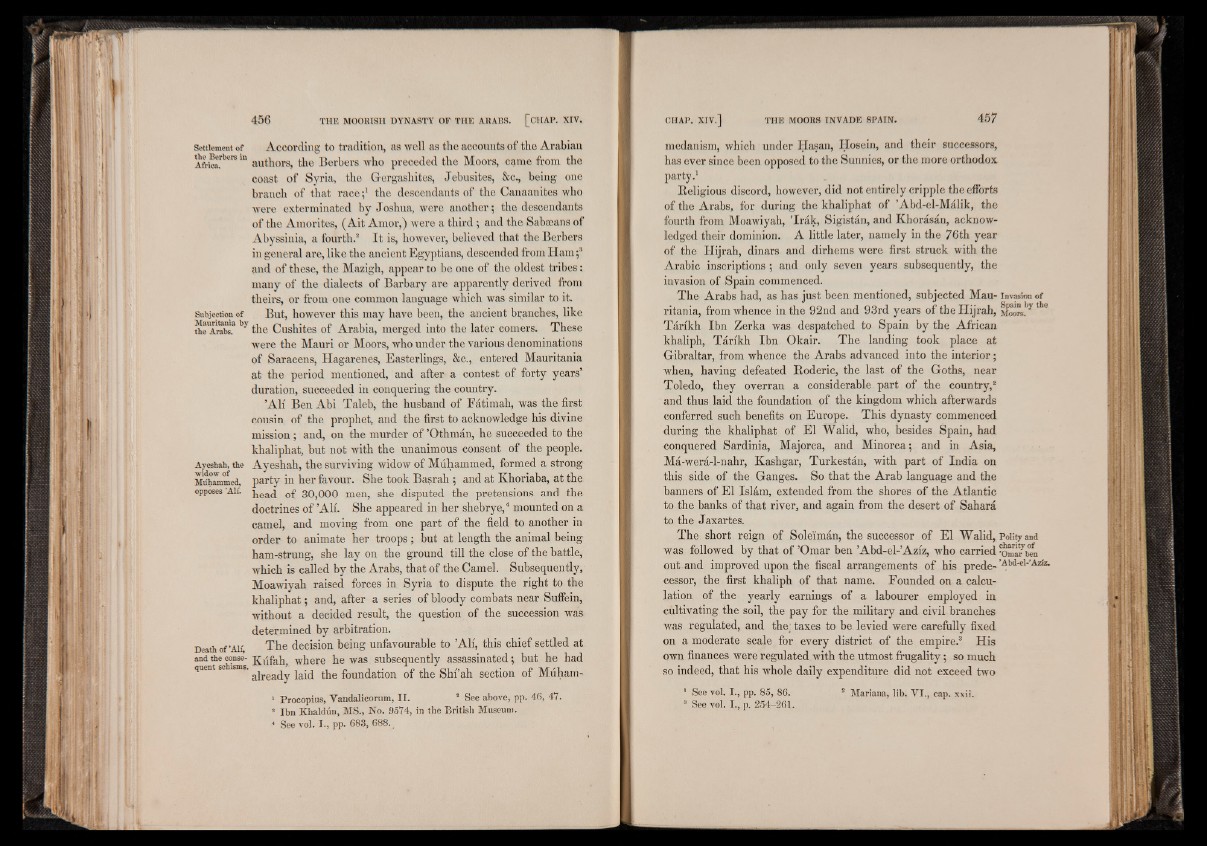
Settlement of
the Berbers in
Africa.
Subjection of
Mauritania by
the Arabs.
Ayeshah, the
■widow of
Muhammed,
opposes 'All.
Death of ’Al£
and the consequent
schisms.
According to tradition, as well as the accounts of the Arabian
authors, the Berbers who preceded the Moors, c^me from the
coast of Syria, the Gergashites, Jebusites, &c., being one
branch of that race;1 the descendants of the Canaanites who
were exterminated by Joshua, were another; the descendants
of the Amorites, (Ait Amor,) were a third; and the Sabseans of
Abyssinia, a fourth.8 It is, however, believed that the Berbers
in general are, like the ancient Egyptians, descended from Ham ;3
and of these, the Mazigh, appear to be one of the oldest tribes:
many of the dialects of Barbary are apparently derived from
theirs, or from one common language which was similar to it.
But, however this may have been, the ancient branches, like
the Cushites of Arabia, merged into the later comers. These
were the Mauri or Moors, who under the various denominations
of Saracens, Hagarenes, Easterlings, &c., entered Mauritania
at the period mentioned, and after a contest of forty years’
duration, succeeded in conquering the country.
’Ali Ben Abi Taleb, the husband of Fatimah, was the first
cousin of the prophet, and the first to acknowledge his divine
mission; and, on the murder of ’Othman, he succeeded to the
khaliphat, but not with the unanimous consent of the people.
Ayeshah, the surviving widow of Muhammed, formed a strong
party in her favour. She took Basrah ; and at Khoriaba, at the
head of 30,000 men, she disputed the pretensions and the
doctrines of ’Ali. She appeared in her shebrye,4 mounted on a
camel, and moving from one part of the field to another in
order to animate her troops; but at length the animal being
ham-strung, she lay on the ground till the close of the battle,
which is called by the Arabs, that of the Camel. Subsequently,
Moawiyah raised forces in Syria to dispute the right to the
khaliphat; and, after a series of bloody combats near Suffein,
without a decided result, the question of the succession was
determined by arbitration.
The decision being unfavourable to ’Ali, this chief settled at
Kufah, where he was subsequently assassinated; but he had
already laid the foundation of the Shi’ah section of Muham-
■ Procopius, Vandalicorum, I I . 3 See above, pp. 46, 47.
3 Ib n Khaldun, MS., No. 9574, in the British Museum.
* See vol. I ., pp. 683, 688.
medanism, which under Hasan, Hosein, and their successors,
has ever since been opposed to the Sunnies, or the more orthodox
party.1
Religious discord, however, did not entirely cripple the efforts
of the Arabs, for during the khaliphat of ’Abd-el-Malik, the
fourth from Moawiyah, ’Irak, Sigistdn, and Khorasdn, acknowledged
their dominion. A little later, namely in the 76th year
of the Hijrah, dinars and dirhems were first struck with the
Arabic inscriptions; and only seven years subsequently, the
invasion of Spain commenced.
The Arabs had, as has just been mentioned, subjected Mau- invasion of
ritania, from whence in the 92nd and 93rd years of the Hijrah, M^ore!’y 1
Tarikh Ibn Zerka was despatched to Spain by the African
khaliph, Tarikh Ibn Okair. The landing took place at
Gibraltar, from whence the Arabs advanced into the interior;
when, having defeated Roderic, the last of the Goths, near
Toledo, they overran a considerable part of the country,2
and thus laid the foundation of the kingdom which afterwards
conferred such benefits on Europe. This dynasty commenced
during the khaliphat of El Walid, who, besides Spain, had
conquered Sardinia, Majorca, and Minorca; and in Asia,
Ma-wera-l-nahr, Kashgar, Turkestan, with part of India on
this side of the Ganges. So that the Arab language and the
banners of El Islam, extended from the shores of the Atlantic
to the banks of that river, and again from the desert of Sahara
to the Jaxartes.
The short reign of Soleiman, the successor of El Walid, Polity and
was followed by that of ’Omar ben ’Abd-el-’Aziz, who carried >omarben
out and improved upon the fiscal arrangements of his prede-Abd'el*Az!z’
cessor, the first khaliph of that name. Founded on a calculation
of the yearly earnings of a labourer employed in
cultivating the soil, the pay for the military and civil branches
was regulated, and the; taxes to be levied were carefully fixed
on a moderate scale for every district of the empire.3 His
own finances were regulated with the utmost frugality; so much
so indeed, that his whole daily expenditure did not exceed two
1 See vol. I., pp. 85, 86.
3 See vol. I., p. 254-261.
2 Mariana, lib. V I., cap. xxii.